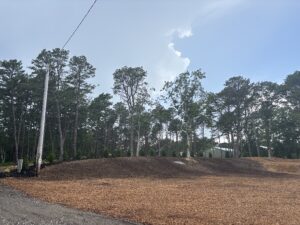TRURO — A state Land Court judge has set a pretrial conference for Aug. 14 to discuss three appeals related to whether the bulk sale of landscaping material on the former Jack’s Gas property at 100 Route 6 is allowed.

The land is in the Cape Cod National Seashore. Businessman Robert Martin argues the use is allowed, while the town’s building commissioner and zoning board of appeals say it isn’t.
Martin leased the property from the Aiken family in January 2023 for his landscaping business. Within a couple of months, he had leveled the 1.7-acre lot, brought in piles of gravel, and installed concrete bays to hold mulch and other supplies, which Martin sold in bulk.
By spring, he was getting pushback. Over the next several months, Martin was served with two cease-and-desist orders by then-Building Commissioner Richard Stevens, which were upheld on appeal by the zoning board.
In Truro’s National Seashore District, commercial and industrial activities are limited to those that existed before the establishment of the Seashore in 1961. Pre-existing businesses can’t be altered or expanded under federal rules for national parks.
Martin was given a deadline by the zoning board to clear all his materials off the lot by the start of 2024. Martin complied, but he has since filed two appeals in state Land Court.
A Cease-and-Desist Snafu
When the Cape Cod National Seashore was established, a gas station, Jack’s Gas, was the only business operating at 100 Route 6. The late Richard Aiken bought the property in 1978 and continued to run the gas station, adding the sale of firewood as an ancillary business. Neither the town nor Seashore officials took any action to curtail the firewood business.
A leaking underground fuel tank put an end to the sale of gas on the property in 1998 and required a lengthy cleanup of soil and groundwater. Aiken continued to sell firewood and items like T-shirts, tourist maps, and soft drinks at what had been the gas station until 2003, when a fire destroyed the building.
National Seashore officials said at the time that the sale of firewood didn’t predate the 1961 establishment of the Park, but they allowed Aiken to continue doing so to help fund the cleanup of the site. The Aiken family has continued to lease the property to various firewood sellers over the last several years.
In January 2023, Andrew Aiken signed a lease with Martin, who began setting up his business.
Then-National Seashore Supt. Brian Carlstrom wrote to the building commissioner saying Martin’s activities were unlawful, prompting Stevens to issue a first cease-and-desist order in May 2023.
Martin and his attorney, William Henchy, asked the zoning board to overturn Stevens’s order. While the ZBA upheld the building commissioner on Nov. 6, 2023, the panel failed to file its decision with the town clerk by the 14-day deadline for such filings.
Henchy seized the opportunity, filing a notice with the town clerk on Nov. 21 that the board’s failure to meet the deadline amounted to “constructive approval” of Martin’s appeal.
On Nov. 22, the ZBA filed its decision — but it was two days too late.
Stevens issued a second cease-and-desist order on Nov. 29, which Martin and Henchy also appealed to the zoning board. Henchy called Stevens’s action an attempt at a do-over. The zoning board again upheld Stevens’s order.
Looking to Build
Henchy has filed two appeals in Land Court on behalf of Martin and the Aiken family. One asks the court to declare Martin’s appeal of the first cease-and-desist order constructively granted and to annul the Nov. 6 decision by the zoning board.
The other appeals the zoning board’s unanimous decision to uphold the second cease-and-desist order.
Building Commissioner Stevens meanwhile filed a complaint against Martin, Aiken, and the zoning board in Barnstable Superior Court on Dec. 8, 2023, seeking to have the constructive approval annulled and the zoning board’s Nov. 6 vote and decision affirmed. That case has been moved to Land Court, where all three cases have now been consolidated.
Recently, there has been some activity at 100 Route 6. Martin has continued altering the lot, planting a line of Leyland cypress trees and adding a driveway leading to the rear of the property. In a phone interview, Martin told the Independent that he planted the trees because he plans to build a house on the property for himself and his wife, adding that he has a verbal agreement with Aiken to buy the property. “I’m looking to close in the near future,” he said.
Martin went on to say that both he and the town would like to settle the case. “We gave them what we consider a pretty fair proposal to keep it out of court,” he said. “We’ll see what they say, and we’ll go from there.”
Henchy downplayed Martin’s claim that a settlement was imminent, telling the Independent, “I’m obviously talking to the town’s attorneys, but we haven’t gotten to the point where we have any concrete proposals to discuss.”
Henchy reiterated his position that Martin has the right to operate a business on the lot.
“There’s been a retail operation there since the 1960s,” Henchy said. “Nobody disputes that. The technical, legal dispute is on whether or not there’s been a change or expansion of that business over time, or more particularly, whether Bobby’s operation constituted a change or expansion.”
Land Court Judge Michael Vhay, in his pretrial conference order, wrote that all parties must discuss the issues presented by the cases and whether alternative dispute resolution is an appropriate route to narrow the issues or resolve the appeals. A joint report is due to the court prior to the Aug. 14 conference.



